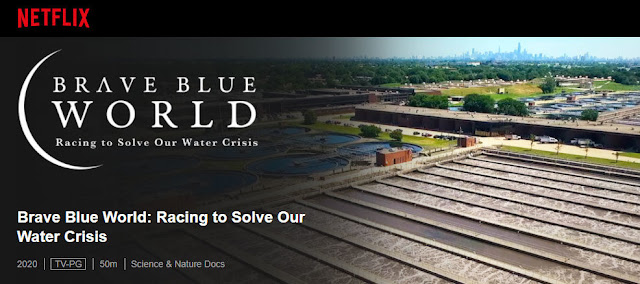Solving the Water Crisis
I recently watched a documentary which I heard about through a colleagues blog, called 'Brave Blue World: Racing to Solve Our Water Crisis', which sparked my interest so I thought I would share it.
The film focuses on innovation towards sustainable water and uses examples from all over the world, making it clear that difficulties regarding water resources are not just found in developing regions. Often the water crisis is discussed in a negative light and rightly so, however this documentary gives people hope that we are moving in the right direction, that there is potential to deal with the issues. The correct management is crucial and it starts at a local scale. They split the water crisis down into three key areas - water scarcity, the need for resilient infrastructure with regards to climate change and making it affordable. I thought this was a good way to take all factors into consideration, from the physical aspects of water availability and the interdisciplinary impacts of climate change to social elements such as cost.
Relating to my post on floods and droughts in Kenya, the documentary mentions a couple of examples from Kenya where people have come up with solutions to their water problems. One focuses on water in terms of sanitation. Sanivation, works to sustainably provide toilets in households and waste treatment for local people. Previously communities struggled with shared toilets and unsafe conditions, however now the risk of diseases is lower as the waste is regularly collected. The waste is then treated and converted into an energy product that can be used instead of charcoal and wood. This reduces carbon emissions and they are working with the local governments to be able to reach more people across Kenya.
Another example looks at Beth Koigi who grew sick of getting sick from water borne diseases so decided to take action and created her own water filter. She went and taught communities how to do the same and make home made water filters in an affordable way. However, when there was a big drought in 2016, she realised that there was not enough water to filter. Therefore she thought that there must be another way to get water instead of travelling long distances for contaminated river water. That is why she founded and designed a ways to draw water from the atmosphere. Her project is called Majik Water. The video below is a TEDx talk in which Beth Koigi discusses the journey that lead to Majik water and the methods used to get water from the atmosphere. One method uses materials that absorbed water due to it's high affinity to water. The other uses condensation, where air is drawn in and put through a condenser coil generating clean water ready to drink.
With the ever looming impacts of climate change on water resources and the demand for water increasing due to lifestyle changes and population growth, these innovations are key in helping to meet the SDGs. I think that community based projects are a really good way of doing just that. However, it is easy to say that everyone should have piped water in their homes but that is not always the best possible or most sustainable method. The same solution does not work in everyone in all locations, therefore initiatives should assess the needs of the target population and area in order to achieve the best solution.


A really informative blog post Sana. I can tell you have really researched deeply into this topic. I especially like how you linked the documentary with your research and previous blog posts. Also using the example of Beth Koigi made this post very engaging in my opinion. Well done!
ReplyDeleteThank you so much for reading! I think innovations like this and the correct management are vital when it comes to solving water related problems (sustainable solutions are especially important).
DeleteI really liked this post, you have encouraged me to watch the documentary! Beth Koigi's story own story in the matter really helps me engage and understand the topic better.
ReplyDeleteThank you! Yes, I defiantly think it is so important to hear stories like Beth's because it puts things into perspective as she is not an outsider looking into solving the water related problems in her community, she has experienced them first hand and wanted things to change.
Delete